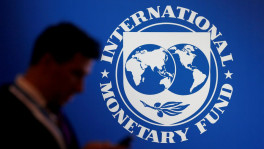Billionaire space race: Dawn of a new age or fanciful whimsies of the rich?
Branson’s latest trip on Sunday aboard a Virgin Galactic spaceship will be followed by Jeff Bezos’s rocket flight with Blue Origin on July 20. But jet fuel isn't the only factor propelling the space flights carrying multi billionaires.

The space rivalry is very heated at this point. Last month Amazon founder Jeff Bezos confirmed that he would go to the edge of space on 20th of this month, with an anonymous billionaire who bought a $28 million ticket - marking the Apollo 11 moon ladnding's 52nd anniversary.
Meanwhile, another billionaire Richland Branson--probably in a hurry to steal the thunder-- went up in his Virgin Galactic flight this Sunday. In his long-awaited space-test flight, he took off together with five workers of his Virgin Galactic Holdings.
Many have dubbed this successful sub-orbital flight of Branson as a milestone for the future of space travel. Nine days before Bezos was about to travel on a rocket manufactured by Blue Origin, Branson probably wanted to illustrate the capabilities of Virgin Galactic.
Behind the apparent theatrics, both firms are actually on a mission to target ultra-rich tourists who want to spend top dollars to have a view of the earth from the sky. And this summer will be remembered because of the milestone blast-off of the two billionaire's space races.
Clash of egos or what?
Branson's latest trip on Sunday aboard a Virgin Galactic spaceship will be followed by Jeff Bezos's rocket flight with Blue Origin on July 20. But jet fuel isn't the only factor propelling the space flights carrying multi billionaires Elon Musk, Jeff Bezos, and Richard Branson. Egocentric personal agenda of one-upmanship is a powerful motivator too.
Although only available to a small number of very rich clients, the journeys would offer a new dimension to a growing private space sector economy with travel plans for the International Space Station and new human outposts.
Many critics have argued that the billionaire space rally is a dramatic ego competition. In these lavish projects, billions of dollars are spent as well as resources and time in order to fulfill mostly personal agendas rather than actually gaining something. The role of ego, personal branding and prospect of personal glory cannot and should not be ruled out.
In an interview with CNN's Fareed Zakaria, astrophysicist Neil deGrasse Tyson analysed whether billionaire Richard Branson's historic space flight is in fact "space travel" at all.
"To you, is this space travel?" Zakaria asked. "No," Neil DeGrasse Tyson chuckled awkwardly. "I'm sorry."
Tyson probably gave the most frank answer about the fuzz going on. He explained that a brief journey to 50 miles above the earth's surface is not really a space travel. "First of all, it's suborbital and NASA did that 60 years ago."
He correctly pointed out that Branson and Bezos are not going anywhere like the Moon or Mars. Zakaria also pointed out that there is no gain of knowledge that comes from boldly going where man has gone many times before.
A sport for the super-rich
Bezos and Branson's initiatives--creating space tourist spots in the earth's suborbit - are basically for the super rich who want to take a good view of the earth from the sky by spending a criminally big amount.
"There are big egos at play here," said Brad Stone, author of 'Amazon Unbound: Jeff Bezos and the Invention of a Global Empire.'
"They are three of the most iconic entrepreneurs and all used to winning. Jeff is not used to being second or third. Elon is a gambler. He's risked it all a number of times."
On the flipside, Elon Musk's SpaceX's mission is little different. Musk is more interested in colonising Mars rather than making travelling attraction destinations.
One thing that really defines him is his plan to make Mars our second home. It is probably the most daunting task he has ever undertaken. At all of his lifelong fascination with space exploration, Mars is at the centre of his undertakings. Moreover, SpaceX has been able to send hundreds of successful flights by sending astronauts into outer space.
SpaceX is also developing a rocket designed to reach the moon and Mars, rapidly expanding its satellite-launch business and building a network of Starlink satellites to provide internet service around the world.
While the Musk-Branson bromance is no secret, their relationship with Bezos is not friendly, to say the least.
Often Musk has publicly indicated his doubt of Bezos. "We are likelier to discover unicorns dancing in the flame duct" than for a Blue Origin ship to "dock with the Space Station," he once said indirectly.
Jabs from Bezos have been subtle. He once tweeted "Welcome to the club" when Musk eventually landed a rocket vertically in 2015. Needless to say this provoking comment made the point that Bezos was first.
And now Branson - who has always loved a spectacle - is creating a distraction. His Virgin Galactic, formed in 2004 and selling tickets for $250,000, pledged to take flights in and around 2008. The original timetable faced many setbacks and accidents, however the project is still up and running.
Not a new phenomenon
However, neither space travel nor billionaires in space is a new phenomenon. Dennis Tuto, often called the first real space tourist, spent $20 millions in 2001 for a flight to the ISS by Russian spacecraft. Having a net worth of $1 billion, he arguably beat today's billionaires by 20 years.
Orbital space tourism, followed by six more billionaires after Tito, however, came to a halt in 2010 as the crew size expanded and in 2011 due to the end of the US Space Shuttle. It saw an unexpected stop to orbital space tours.
But no one is stopping the individual entrepreneurs. And space tourism is becoming a thing of reality in the private sector in full swing.
But what exactly did Branson achieve, other than spending money he earned exploiting the minimum wage workers and bolstering them by moving those in offshore tax havens?
In an extravagant showdown, he will crown only personal glory and brading for his other businesses rather than heralding a new era of space tourism.
We understand the dream they weave into making us believe in the fulfilment of a collective hope of our human race into a Star Trek like future but the reality is far from it.
Fantasy of spacefaring human civilization however has long been the subject of science fiction. Space tourism sounds exciting, ambitious and futuristic. But the amount of money one needs to pay for it is literally bringing us down to earth from our stay in the cloud.
This is because early bookings for Virgin Galactic flights cost $250,000, while a seat on Bezos' upcoming Blue Origin trip on July 20 sold for $28 million--amounts which only the tiniest fraction of the human population can even think of spending for a cause as banal as this.
So, any genuine evaluation of the billionaire space sprints reveals that it is less the beginning of a new age of universal space travel and more of self-dealing billionaire's tussle in stealing the glory amongst themselves.


 Keep updated, follow The Business Standard's Google news channel
Keep updated, follow The Business Standard's Google news channel
















